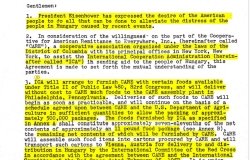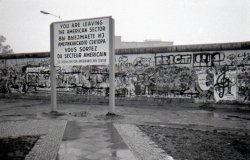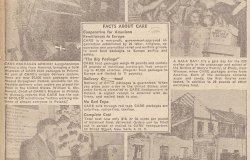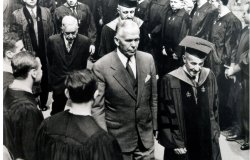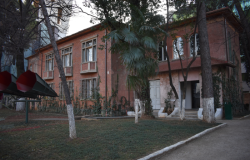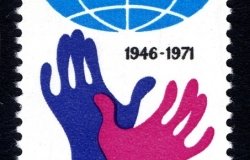Indian Government Announces Major Release of Foreign Policy Documents at NPIHP-IDSA Workshop in New Delhi
India's Ministry of External Affairs (MEA) has just announced the impending release of 220,000 newly declassified files on India's foreign policy history. Speaking at an NPIHP-Institute for Defence Studies and Analyses (IDSA) workshop on "The Early Years of Nuclear Cooperation and Non-Proliferation" in New Delhi, MEA Special Secretary Pinak Chakravarty explained that "It is understandable that the historical evolution of our nuclear policy and development of strategic thinking in this area is a matter of considerable academic interest ... We welcome academic inquiry and analysis on this subject."
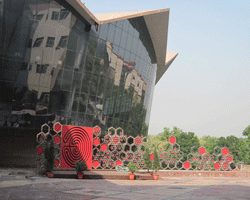
Speaking at a 10 October 2012 workshop organized by the Institute for Defence Studies and Analyses (IDSA) and the Wilson Center's Nuclear Proliferation International History Project (NPIHP) on The Early Years of Nuclear Cooperation and Non-Proliferation: A Dialogue on Nuclear Historicities, Indian Ministry of External Affairs (MEA) Special Secretary for Public Diplomacy Pinak Chakravarty announced the impending release of 220,000 newly declassified files on India's foreign policy history. According to Chakravarty, "It is understandable that the historical evolution of our nuclear policy and development of strategic thinking in this area is a matter of considerable academic interest" ... "We hope that this [new release] will lead to renewed academic interest and greater understanding of the evolution of Indian foreign policy."
Within the Wilson Center, the Nuclear Proliferation International History Project is part of the History and Public Policy Progam, where it is closely associated with the Cold War International History Project (CWIHP). NPIHP is a global network of individuals and institutions engaged in the study of international nuclear history through archival documents, oral history interviews and other empirical sources. Recognizing that today’s toughest nuclear challenges have deep roots in the past, NPIHP seeks to transcend the East vs. West paradigm to work towards an integrated international history of nuclear weapon proliferation.
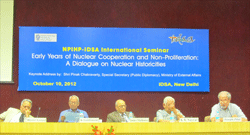 Last week's major document release came following an earlier release of 70,000 MEA files, and in the context of a series of meetings in New Delhi organized by IDSA and NPIHP to shed new light upon India's nuclear and foreign policy history.The centerpiece of these meetings was the IDSA-hosted workshop The Early Years of Nuclear Cooperation--the first-ever international meeting on nuclear history ever held in India.
Last week's major document release came following an earlier release of 70,000 MEA files, and in the context of a series of meetings in New Delhi organized by IDSA and NPIHP to shed new light upon India's nuclear and foreign policy history.The centerpiece of these meetings was the IDSA-hosted workshop The Early Years of Nuclear Cooperation--the first-ever international meeting on nuclear history ever held in India.
Conceived and organized by IDSA Director General Arvind Gupta and Associate Fellow A. Vinod Kumar in cooperation with NPIHP, the workshop began with welcoming remarks from Arvind Gupta, a keynote address by Pinak Chakravarty, and a special address by NPIHP Co-Director Christian Ostermann. Opening the meeting, IDSA Director General Arvind Gupta discussed the leading role that IDSA has taken within NPIHP, and in the project's effort to lend new perspectives to scholars' and policy-makers' understanding of global nuclear history. According to Gupta, "framing a proper Indian perspective, understanding, and interpretation on these key issues and redressing the knowledge gaps is one primary objective of our nuclear history project." In his special address, NPIHP Co-Director Christian Ostermann explained that NPIHP aims to address "a fundamental imbalance in our historical understanding" which stems from the fact that until comparatively recently "most serious historical scholarship was based almost exclusively on Western, in particular American, documents and sources, and it thus represented a one-sided view."
The academic panels which comprised the workshop featured nuclear historians--including NPIHP Senior Advisor Joseph Pilat--as well ascurrent and former officials and journalists from throughout India and around the world. Discussions centered on "The early years of international nuclear cooperation," "Nehru, non-proliferation and the bomb," and "India's nuclear decision-making, 1964-1974." All three panels featured both acedemic research as well as personal insights and recollections provided by panelists and audience participants alike, many of whom underlined the potential for archival research to augment existing understandings of Indian foreign policy and nuclear history. Full details on the workshop proceedings are available on the IDSA website.
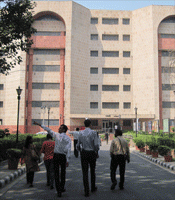
The Wilson Center
Alongside the workshop on The Early Years of Nuclear Cooperation, other NPIHP-IDSA meetings at the National Archvies of India as well as at the Nehru Memorial Museum and iIbrary underscored the possibilities for archival research on India's foreign policy and nuclear history which are now emerging. An examination by the NPIHP-IDSA delegation of the National Archvies of India's finding aids for the declassified MEA documents in its holdings revealed a large collection of materials related to many important aspects of India's post-independence foreign policy. In order to make these materials more accessible to researchers outside of India, IDSA's library staff, led by Mukesh Kumar Jha, with support from S. Suresh, has created an online list of declassified files of the Ministry of External Affairs from 1903-1972. While the files themselves are only accessible in hard-copy at the National Archives of India, the IDSA-generated finding aid is an incredibly useful tool for researchers working on the history of India's foreign policy.
In addition to the growing collection of declassified MEA documents on the history of Indian foreign policy which are available via the National Archvies of India, an NPIHP-IDSA delegation met with NMML Director Mahesh Rangarajan. The Nehru Memorial Museum and Library (NMML) is home to India's largest collection of personal papers, as well as an oral history section which features a large and growing collection of transcripts and recordings of interviews with key figures in Indian political, foreign policy, and nuclear history.
NPIHP, CWIHP, and their sister projects have plans to compile a new, major research collection focusing on Indian foreign and nuclear policy which will draw heavily upon these newly declassified materials from the MEA, and hopefully, in the future, other Indian government ministries. This work will build upon past CWIHP efforts to integrate Indian documents and perspectives into the larger Cold War historiography, including a landmark 2009 conference on India and the Cold War, 1947-1991, and a 17-18 December 2010 CWIHP co-sponsored conference on India and the Cold War: Historical and Contemporary Perspectives hosted by the Nehru Memorial Museum and Library.
Commenting upon these new developments, NPIHP Co-Director Christian Ostermann observed that the planned release of 220,000 files, and the promise of more such releases in the future, has the potential to "effectively end an era in which India's role in the Cold War was researched and told based solely on documents from other countries."
About the Author

Nuclear Proliferation International History Project
The Nuclear Proliferation International History Project is a global network of individuals and institutions engaged in the study of international nuclear history through archival documents, oral history interviews, and other empirical sources. At the Wilson Center, it is part of the Wilson Center's History and Public Policy Program. Read more

Cold War International History Project
The Cold War International History Project supports the full and prompt release of historical materials by governments on all sides of the Cold War. Through an award winning Digital Archive, the Project allows scholars, journalists, students, and the interested public to reassess the Cold War and its many contemporary legacies. It is part of the Wilson Center's History and Public Policy Program. Read more

History and Public Policy Program
The History and Public Policy Program makes public the primary source record of 20th and 21st century international history from repositories around the world, facilitates scholarship based on those records, and uses these materials to provide context for classroom, public, and policy debates on global affairs. Read more
